 | |
Argentina | New Zealand |
|---|---|
Diplomatic relations between the Republic of Argentina and New Zealand, have existed for decades. Both nations are mutual members of the Cairns Group and the United Nations.
 | |
Argentina | New Zealand |
|---|---|
Diplomatic relations between the Republic of Argentina and New Zealand, have existed for decades. Both nations are mutual members of the Cairns Group and the United Nations.

Argentina and New Zealand are two industrialized southern hemisphere nations. Diplomatic relations between both nations were established in 1964. [1] Relations, however, between the two nations were very limited, in part because of the distance between them. It wasn't until 1977 that Argentina opened an embassy in Wellington. [2]
In 1976, Argentina came under a military dictatorship which became increasingly hostile and asserted its claims over the Falklands Islands (which are British Overseas Territories in the South Atlantic Ocean). In April 1982, Argentina invaded the Falklands Islands, triggering what was to be known as the Falklands War. Immediately after the invasion of the Islands by Argentine troops, New Zealand severed diplomatic relations with the Argentine government and imposed economic sanctions. [2] [3] The war ended with a British victory in June 1982. In 1984, Argentina and New Zealand re-established diplomatic relations. [4] In 1987, Argentina opened a consulate in Auckland and re-opened its embassy in Wellington in 1997. [2] In April 1998, Argentina's President, Carlos Menem, paid a visit to New Zealand and met with New Zealand Prime Minister Jenny Shipley. [5] That same year, New Zealand re-opened its embassy in Buenos Aires. [6]
Since the re-establishment of relations, both counties have worked together to improve global agricultural trade, preserve Antarctica and the Southern Ocean, and lobby the international community for awareness of climate change, whale conservation, international human rights, peace-keeping and non-proliferation of weapons. [7] In November 2001, New Zealand's Prime Minister, Helen Clark, paid a visit to Argentina. [8] Both countries have established a working holiday visa scheme. In December 2015, Air New Zealand began direct flights between Auckland and Buenos Aires. [9] In 2017, Argentina's Secretary of Agriculture, Ricardo Negri, visited New Zealand. [7]
High-level visits from Argentina to New Zealand
High-level visits from New Zealand to Argentina
In 2016, total trade between Argentina and New Zealand totaled US$199 million. [7] Argentina's main exports to New Zealand include: soya bean oil cake, sugar, prepared and preserved fruits and nuts, and vehicles. New Zealand's main exports to Argentina include: paper products, aircraft, machinery, albuminoids, starches and glues, and electrical machinery. [7]
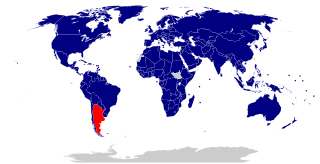
This article deals with the diplomatic affairs, foreign policy and international relations of Argentina. At the political level, these matters are handled by the Ministry of Foreign Affairs, also known as the Cancillería, which answers to the President. The current Minister of Foreign Affairs, since September 2021, is Chancellor Santiago Cafiero.

Bilateral relations between the Argentine Republic and Canada have existed for over a century. Both nations are members of the Cairns Group, G20, Lima Group, Organization of American States and the United Nations.
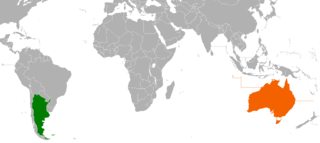
Bilateral relations between Argentina and Australia have existed for years. Both nations are members of the Cairns Group, Forum of East Asia–Latin America Cooperation, G20 and World Trade Organization.

The current and historical relations between the Argentine Republic and the Republic of South Africa, for over a century. Both nations are members of the Cairns Group, G20, Group of 77 and the United Nations.

Diplomatic relations between Argentina and Ukraine, have existed for decades. Both nations enjoy friendly relations, the importance of which centers on the history of Ukrainian migration to Argentina. Ukrainians in Argentina form the second largest Ukrainian community in Latin America numbering approximately 250,000 Ukrainians and their descendants. Both nations are members of the World Trade Organization.
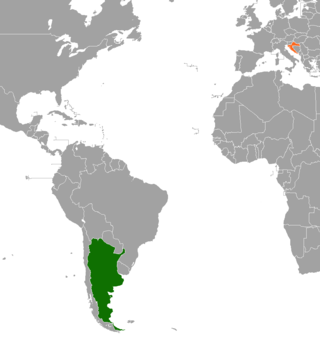
Argentina–Croatia relations refers to the diplomatic relations between the Argentine Republic and the Republic of Croatia. Both nations enjoy friendly relations, the importance of which centers on the history of Croatian migration to Argentina. There is approximately a community of 250,000 Argentines of Croatian descent. Both nations are members of the United Nations.

Foreign relations between the Argentine Republic and the United Kingdom of Great Britain and Northern Ireland have existed for over a century.
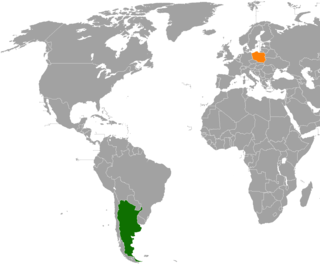
Diplomatic relations between Argentina and Poland, have existed for over a century. Over 500,000 Argentines are of Polish descent making Argentina the second Latin-American country with the largest Polish community abroad.

The Armenian community in Argentina is the largest in Latin America totaling approximately 120,000 members.

Current and historical relations between the Argentine Republic and the Russian Federation have existed for decades. Both nations are members of the G20, United Nations and the country is a potential new member of the BRICS grouping which includes Brazil, Russia, India, China and South Africa

Diplomatic relations between the Argentine Republic and Hungary have existed for decades. Argentina is host to one of the largest Hungarian communities outside of Hungary. There are approximately 30,000 to 40,000 Argentines of Hungarian descent. Both nations are members of the United Nations.

Diplomatic relations between the countries Argentina and Lebanon, have existed for over a century. Both nations enjoy friendly relations, the importance of which centers on the history of Lebanese immigration to Argentina. There are approximately 1.5 million Argentines of Lebanese descent. The Lebanese community in Argentina is the third largest immigrant community in the country and Argentina is host to the second largest community in Latin America. Both nations are members of the Group of 24 and the United Nations.

A current and historical relations between Argentina and Italy, for over a century. Both nations enjoy friendly relations, the importance of which centers on the history of Italian migration to Argentina. Argentines of full or partial Italian ancestry number approximately 30 million, or 62% of the country's total population. Both nations are members of the G20 and the United Nations.

Bilateral relations between the Argentina and Finland, have existed for over a century.

Diplomatic relations between the Argentine Republic and the Republic of the Philippines, have existed for decades. Both nations are members of the Association of Academies of the Spanish Language, Group of 77, the G20 developing nations, and Forum of East Asia-Latin America Cooperation and the United Nations.
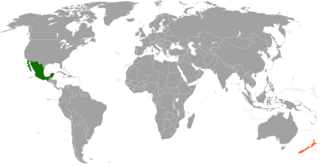
Mexico–New Zealand relations are the diplomatic relations between Mexico and New Zealand. Both nations are members of the Asia-Pacific Economic Cooperation, Organisation for Economic Co-operation and Development and the United Nations.

Chile–New Zealand relations refers to the diplomatic relations between the Republic of Chile and New Zealand. Both nations are mutual members of the Asia-Pacific Economic Cooperation, Cairns Group, OECD and the United Nations.

New Zealand–Poland relations refers to bilateral relations between New Zealand and Poland. Both nations are members of the Australia Group, and the Organisation for Economic Co-operation and Development.
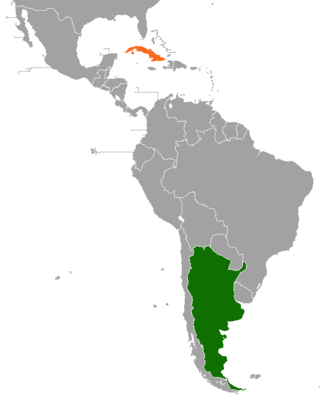
Current and historical relations between Argentina and Cuba, have existed for over a century. Both nations are members of the Community of Latin American and Caribbean States, Latin American Integration Association, Organization of American States and the Organization of Ibero-American States.

Germany–New Zealand relations refers to the current and historical relations between Germany and New Zealand. The importance of their relations centers on the history of German migration to New Zealand. Approximately 200,000 New Zealanders are of German descent, and many German tourists visit New Zealand each year. Both nations are members of the Australia Group, Organisation for Economic Co-operation and Development and the United Nations.